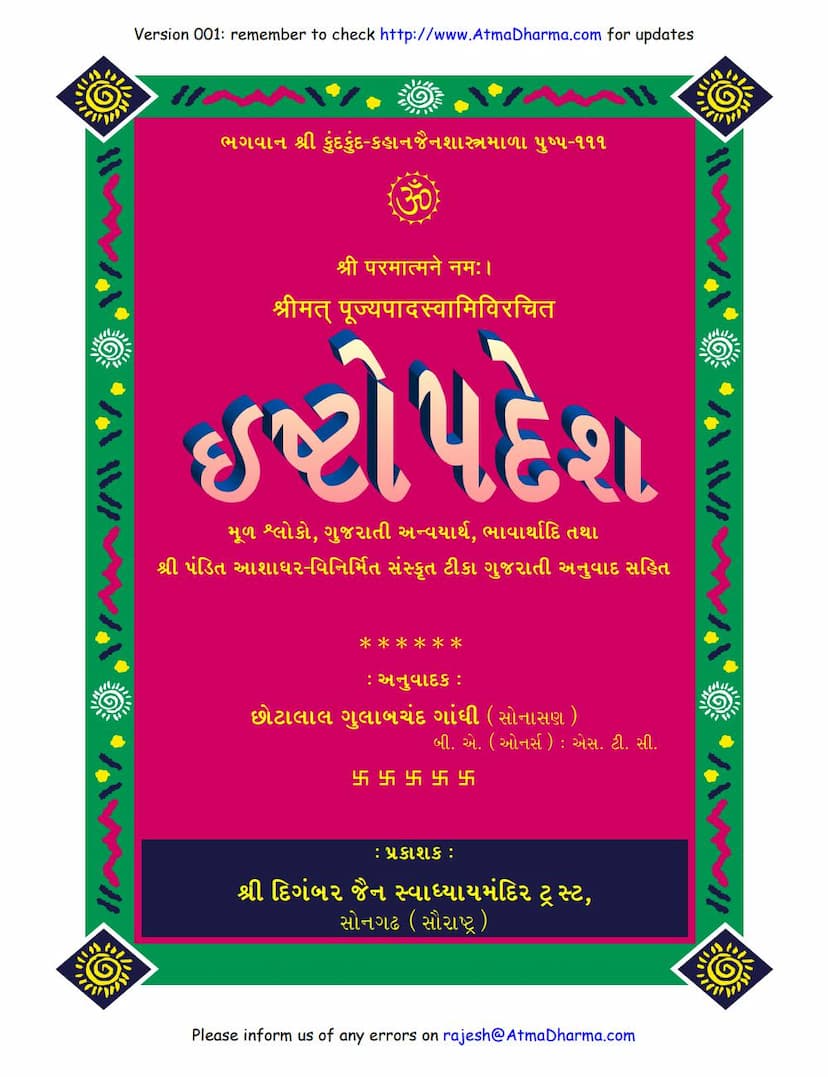Ishtopadesha
Added to library: September 1, 2025

Summary
"Ishtopadesha" (meaning "Teachings on the Desired Goal") is a profound Jain text authored by Pujyapad, a revered Jain Acharya. This summary is based on the provided pages which include introductory material, the Sanskrit text with Gujarati translation and commentary, and a table of contents. The book was published by the Digambar Jain Swadhyay Mandir Trust.
Core Theme and Purpose:
The central theme of "Ishtopadesha" is guiding individuals toward the ultimate spiritual goal: liberation (moksha) and the attainment of the pure, blissful soul (Atman). It emphasizes self-realization and the path to achieving it, focusing on discernment between the self (soul) and non-self (matter, body, passions, etc.). The title itself signifies that it provides teachings on the most desirable objective, which in Jainism is the attainment of the soul's inherent nature.
Key Teachings and Concepts (as gleaned from the introductory and fragmented content):
- Nature of the Soul (Atman): The text describes the soul as pure, blissful, conscious, and eternal, beyond the reach of worldly suffering, karma, and the cycle of birth and death. It is inherently free and possesses infinite knowledge and bliss.
- The Path to Liberation: The book outlines the path to realizing this true nature of the soul, which primarily involves:
- Discernment (Bheda-Vijnana): Understanding the fundamental difference between the soul (self) and all that is not the soul (non-self). This is repeatedly highlighted as the cornerstone of spiritual progress.
- Detachment and Non-Attachment (Nirmohatva): Cultivating a state of detachment from external objects, relationships, and even one's own body, as these are impermanent and ultimately not the true self. The concept of "Nirmamata" (being free from "mine-ness") is emphasized as crucial for liberation.
- Right Faith, Knowledge, and Conduct (Samyak Darshana, Jnana, Charitra): Although not explicitly detailed in the provided fragments, the context of Jain philosophy implies that these three jewels form the core of the path.
- Meditation and Contemplation (Dhyana): The text points towards the importance of focusing the mind inward, on the true nature of the soul, through meditation and contemplation.
- Renunciation of Passions (Raga-Dvesha): The text strongly advises against attachment (raga) and aversion (dvesha), identifying them as the root cause of suffering and the perpetuation of the cycle of rebirth.
- The Illusory Nature of Worldly Happiness: "Ishtopadesha" dismantles the notion of lasting happiness derived from external objects, sensory pleasures, or worldly achievements. It argues that these are fleeting, ultimately unsatisfactory, and often lead to more suffering. The example of the wise person who prefers the true nature of the soul over external attachments is a recurring theme.
- The Role of External Factors: While emphasizing self-effort, the text also acknowledges the role of external factors like the teachings of a Guru and right conditions (such as a conducive environment) as necessary aids (nimitta) in the spiritual journey, though the ultimate cause lies within the individual's own efforts and inherent potential.
- The Power of Right Knowledge: The text underscores that true knowledge, free from delusion and error, is the ultimate means to dispel ignorance (avidya) and attain liberation.
Structure and Commentary:
The text is presented in verses (shlokas) attributed to Pujyapad. The Gujarati translation provides not only the literal meaning but also a deeper interpretation (bhavartha) and commentary (tika) by Pandit Ashadhar, a renowned commentator. This layered approach aims to make the profound spiritual insights accessible to a wider audience. The inclusion of both literal and interpretive translations highlights the nuanced understanding required for spiritual texts.
Key Figures and Their Contributions:
- Pujyapad (Author): A highly learned and virtuous Jain Acharya, known for his mastery in various subjects including grammar, logic, philosophy, and spirituality. His works are considered foundational in Jain literature.
- Pandit Ashadhar (Commentator): A distinguished scholar and a prolific writer who authored numerous commentaries on important Jain scriptures. His commentary in this edition is crucial for understanding the intricacies of Pujyapad's verses.
- Shri Kanji Swami: The text is dedicated to and inspired by the spiritual discourses of Shri Kanji Swami, a contemporary Jain saint whose teachings are revered for their clarity and depth in expounding the principles of self-realization.
- Chhotalal Gulabchand Gandhi (Translator): Credited with the Gujarati translation, his effort is described as motivated by devotion to the teachings of the Jinas.
Overall Message:
"Ishtopadesha" serves as a guide for the seeker of spiritual truth. It urges readers to turn inward, understand their true nature as pure consciousness, and diligently pursue the path of detachment, right knowledge, and meditation to achieve the ultimate goal of liberation. The text is rich with logical reasoning, illustrative examples, and profound philosophical insights, making it a valuable resource for anyone on the spiritual path.